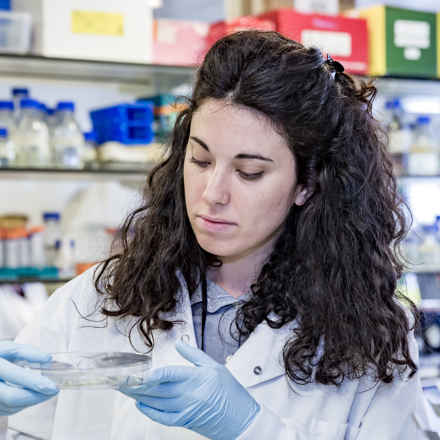New treatment option for wet AMD

Dr James Whiteford, Queen Mary University of London - £148,991
May 2019 - April 2022
Research summary
Wet age-related macular degeneration (AMD) can lead to rapid sight loss. We currently have treatments which work well for most. However, for some people, the drugs don’t work. This project looks at a different way to treat wet AMD, which could help them.
What’s the problem?
While treatment with anti-VEGF drugs is current practice for patients with wet AMD, they don’t work well for everyone. Some patients don’t respond well, so more options need to be available.
What did this project achieve?
The project was able to show that the protein they were testing, called syndecan-3, is able to inhibit blood vessel formation. The researchers were able to find the specific part of the protein that causes the effect and create a miniature version of the protein, which they named QM111. QM111 was then tested in models of wet AMD and was found to be able to stop the wet AMD model progressing and not have any toxic effects or inflammation.
What’s next?
The researchers filed a patent for QM111 and plan to move forward to continue to research this as a new treatment for wet AMD. They are looking to conduct necessary work in order to move towards clinical trials, and are working with a company to take this forward. Alongside this, the team will continue to investigate how other syndecans may be involved in macular disease.
Publications
Pessolano, E., Belvedere, R., Novizio, N., Filippelli, A., Perretti, M., Whiteford, J. & Petrella A “Mesoglycan connects Syndecan-4 and VEGFR2 through Annexin A1 and formyl peptide receptors to promote angiogenesis in vitro.” FEBS J (2021) 288(22):6428-6446
De Rossi, G., Vähätupa, M., Cristante, E., Arokiasamy, S., Liyanage S.E., May, U., Pellinen, L., Uusitalo-Järvinen, H., Bainbridge, J.W., Järvinen T.A.H., & Whiteford, J.R. “Pathological angiogenesis requires Syndecan-4 for efficient VEGFA-induced VE-Cadherin internalization” Arterioscler. Thromb. Vasc. Biol (2021) 41(4):1374-1389
Tsoyi, K, Liang, X, De Rossi, G, Ryter, S.W., Xiong, K, Chu, S.G., Liu, X, Ith, B., Esposito, A.J, Poli,S., El-Chemaly, E, Perrella, M.A, Shi, Y., Whiteford, J.R. & Rosas, I.O., “CD148 deficiency in fibroblasts promotes the development of pulmonary fibrosis” Am. J. Respir. Crit. Care Med. (2021) 204(3):312-325
Belvedere, R., Morretta, E., Pessolano, E., Novizio, N., Tosco, A., Porta A., Whiteford, J., Perretti, M., Filippelli, A., Monti, M.C. & Petrella, A. “Mesoglycan exerts its fibrinolytic effect through the activation of annexin A2.” J Cell Physiol. (2020) 236(7):4926-4943
Shaik F, Balderstone MJM, Arokiasamy S, & Whiteford JR. (2022) ‘Roles of Syndecan-4 in cardiac injury and repair.’ Int J Biochem Cell Biol. 146:106196
Gopal, S., Arokiasamy, S., Pataki, C., Whiteford, J.R. & Couchman, J.R. "Syndecan Receptors: Pericellular Regulators in Development and Inflammatory Disease" Open Biology (2021) 11(2).
Arokiasamy S., Balderstone, M.J.M, De Rossi, G & Whiteford, J.R. (2019) “Syndecan-3 in Inflammation and Angiogenesis” Frontiers in Immunology 10 (2019):3031
Patents
‘Antiangiogenic peptides from Syndecan-3’ Filed 2021 S Arokiasamy, G De Rossi and JR Whiteford
See our other projects
Since 1987 the Macular Society has invested around £10 million in over 100 research projects.
Explore more research
Beating macular disease through funding medical research and improving the lives of those living with macular disease.
Get the latest research news from the Macular Society
To hear about life-changing research and treatments, subscribe to our monthly enewsletter today. Together we can Beat Macular Disease.
Sign up to our free email newsletter



